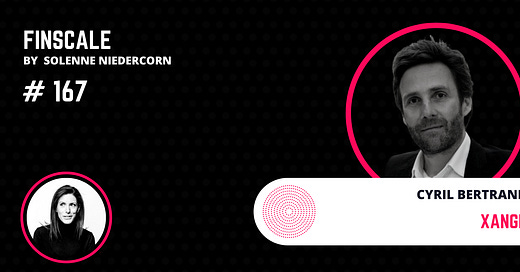Cyril Bertrand (XAnge) - The future of finance, from regenerative finance to digital assets 😇
Managing Partner at XAnge
Between you and me, it wasn't easy to fit this discussion into 30 minutes. The number of topics on the agenda for my discussion with Cyril was quite ambitious.
First, we discuss the profitability constraints of start-ups and their impact on the tech ecosystem as a whole. We also talked about Tech LBOs, and the preparations needed to make a company eligible for this type of buyout, both in terms of management changes and unit economics. We also explore the positioning of Anglo-Saxon funds such as Providence in the financing of growing start-ups, as well as the maturity of funds in continental Europe on this subject.
Of course, Cyril tells us about XAnge, its successes, investment thesis, and the impact of its new shareholder Siparex. We take a look at regenerative finance, a field in which this seasoned investor has recently become interested. Finally, we look at the recent launch of the “Digital Ownership Fund”, detailing the projects supported and operational aspects.
The ABCs of data
Unit economics
Cyril and I discuss the unit economics currently used by investors, and how they have evolved over the last two years.
These are the key financial metrics for assessing a start-up's viability and/or profitability. Both VC and PE funds attach great importance to these indicators when evaluating a company.
For VCs, unit economics provides a clear picture of a start-up's financial health. They look closely at variable costs, such as CAC (Customer Acquisition Cost), all categories of IRR (Internal Rate of Return), LTV (Lifetime Value), ACL (Average Customer Lifetime) to assess the company's ability to generate revenue and achieve profitability. VCs seek to understand how long it will take for them to recoup their initial investment and for the start-up to reach a viable level of profitability.
PE funds, on the other hand, focus more on a company's long-term value. They evaluate unit economics to understand how the company creates value, analyzing metrics such as sales, MRR (Monthly Recurring Revenue), EBITDA or gross margin. PE funds are interested in the company's ability to maintain solid growth, retain existing customers and generate positive cash flow over the long term.
Cohort analysis
Cohort analysis is a type of analysis in which users are grouped together according to their common characteristics. To perform a cohort analysis, data must first be grouped according to when a user was activated. These groupings should be weekly, monthly or quarterly, depending on factors such as sales cycles, contract duration and adoption patterns. You can further filter data by product, use case, persona, segment or vertical.
Cohorts often reveal whether a company is improving its product, its acquisition process (via retention rates) and its "Go To Market" (via CACs).
Siparex
Siparex is a private equity company founded in France in the 1970s with the support of industrial groups such as Peugeot and Michelin, alongside the Royal Bank of Scotland, Fortis, Caisse des Dépôts et Consignations and Crédit Agricole. Over the years, Siparex has grown and diversified, extending its investments from SMEs to ETIs.
Siparex manages several funds, including VC funds, through XAnge, private equity funds, small and mid-cap, mezzanine and redeployment funds. These funds specialize in a range of sectors, including industry, services, healthcare, tech and the environment. Siparex has also won a number of tenders, notably in the nuclear sector, and manages the Fonds France Nucléaire, aimed at supporting companies in the sector.
By 2023, Siparex was expected to have EUR 3.5 billion under management across 7 investment strategies and 10 offices in France and abroad. It is also a Foundation under the aegis of the Fondation Entreprendre.
XAnge
Cyril is one of those discreet venture capitalists who speak for all the right reasons. He and his team have invested in some of the finest fintechs in the European ecosystem.
XAnge's notable investments include Lydia, AB Tasty, Skello, Silvr, Greenly, Shine, Gleamer... The full list is 👉 here.
The AMF extension
As confirmed by Cyril, XAnge is the first investment company to obtain authorization from the Autorité des Marchés Financiers (AMF) to invest in both shares and tokens in Web 3 projects.
As required, XAnge has teamed up with a service provider (PSAN in France) to store the tokens, and with a bank. We also discussed this set-up with Marguerite de Tavernost in the Ledger Cathay episode (here). The stakes involved in recovering tokens from a project are of major interest to funds, as this enables them to benefit from the token's financial performance, both upwards and downwards. On this subject, I invite you to listen again to the episode I recorded with Max Mersch (Fabric Ventures) and David Dana (FEI) in 2021, where Max explains how it works in concrete terms (here).
Note that holding tokens in certain projects gives funds the opportunity to participate in their governance, which strengthens their alignment with the projects.
Otherwise…
📗 Recommendation of the week: The inmates are running the asylum by Alan Cooper
😁 and….
13 unit economic metrics 👉 Read
What are some common pitfalls to avoid when presenting your unit economics and LTV-CAC ratio to VCs? 👉 Read
Cohort Analysis (Google Analytics) 👉 Read
🎧 The episode
XAnge (🇫🇷)
Podcastics / Spotify / Google podcast / Deezer
👋 Contacts
Cyril Bertrand / XAnge
Sources: Siparex, Xange, Visible VC, BPI.








